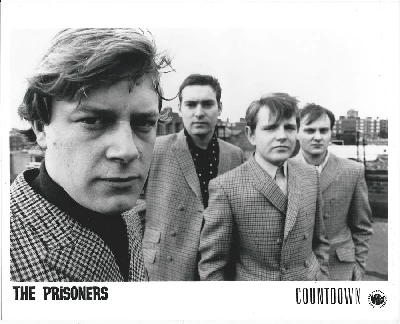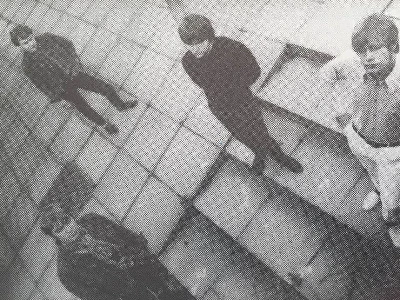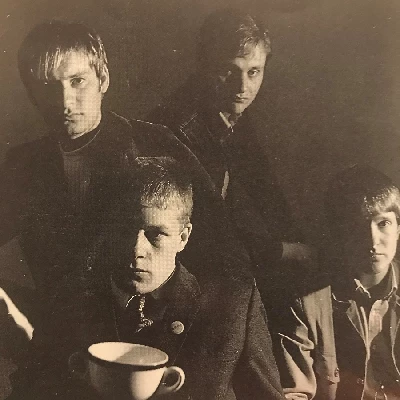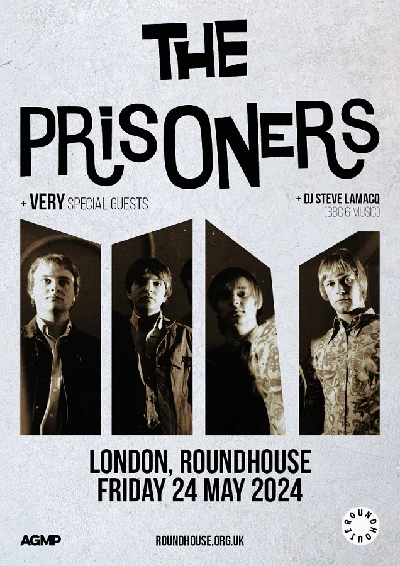published: 19 /
1 /
2024
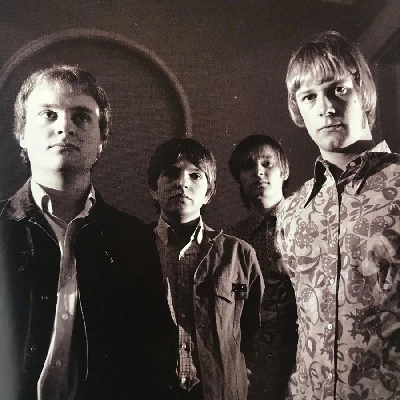
James Taylor, the keyboardist and the organ player, with legendary 80's garage-rock band The Prisoners talks to Denzil Watson about their reformation for a show at The Roundhouse in London and their forthcoming first album in almost forty years.
Article
Legendary garage-rock band The Prisoners formed in Rochester on the Medway Delta in 1980. Tapping into London's underground ;psychedelic revival’ and ‘mod revival’ scene of the early 1980s, they soon made a name for themselves as an incendiary live act and their debut album ‘A Taste of Pink’ released on their own Own Up label in 1982 earned them further plaudits.
Featuring Graham Day (Vocals and Guitar), James Taylor (Vox Continental and Hammond Organ), Allan Crockford (Bass) and Johnny Symons (Drums), the band took their name from the title of the first single by The Vapors. While commercial success evaded them, they managed to put out three more albums and a handful of EPs and grow their cult following. ‘In From The Cold’, their fourth and final album, came out on Stiff Records in 1986, shortly before the band’s demise. Crockford and Day went on to form The Prime Movers and The Solaflares while James Taylor found success with the James Taylor Quarter. A brief reformation in the mid-90s saw a string of gigs and the single ‘Shine On’ released on Steve Lamacq’s Deceptive Records in 1997. The band, however, split again and returned to their other musical projects.
Next year sees the band return to the Roundhouse on 24th May for a massive London show. With a new album in the offing too, 2024 looks set to be an exciting year for the Medway four-piece.
Pennyblackmusic caught up with the band’s Hammond maestro James Taylor for the low-down.
PB: Hi James. Hope you are well. Where are you currently?
JT: I'm down in Rochester.
PB: The home of The Prisoners!
JT: That's right. We were all at school together, you know? We’re old Rochester boys. Where are you?
PB: I'm up in Sheffield.
JT: I love Sheffield. That's a great town it is.
PB: I've seen The Prisoners in Sheffield at The Leadmill.
JT: Oh, I remember that night. Oh my God! I disgraced myself. A very bad night. Nothing bad. I just got drunk.
PB: That's acceptable as a rock star, isn't it?
JT: I suppose so. Depends on how drunk, I suppose. It felt like a sort of pushed the envelope a bit.
PB: I think it would be 1997, I guess.
JT: It was very messy. I gave up drink about six months after that.
PB: So, James, how are things in The Prisoners’ camp?
JT: Very, very well. Very happy, thank you. It just couldn't be better. It's like a little family and there's been a reunion. And so that's a happy place to be, and we're enjoying being with each other and working with each other, and all that goes with that. All that was there when we were teenagers, basically,
PB: That's the foundations of bands in the first place really, isn't it?
JT: Yeah, the humour and all that. We had a long day in the studio yesterday and it was just a joy.
PB: I’m guessing you are excited about the London Roundhouse gig in May?
JT: Yeah, I’m quite nervous about that one. That's a big old barn of a gig, so, yeah, you know, we get on stage and play our sons and hopefully people will dance around and enjoy it. That's a big undertaking for us. That's like Gillingham FC doing Wembley, you know?
PB: I like the analogy. My next question was going to be “Have you started preparations yet?” but it sounds like preparations are already underway.
JT: Well, we've written an album, and we're going to release that album,; and we're going to perform that album plus some of the old stuff at the Roundhouse gig.
PB: Okay. Yeah. There was a picture that appeared on The Prisoners’ Facebook page that was very cryptic and of a big studio somewhere.
JT: That was at Abbey Road.
PB: There was no comment, but people were speculating that new material was in the offing.
JT: Oh yeah, some fantastic songs really. I'm so happy. Songs that sound like a bit like “Hush”, a bit like late Small Faces and early Deep Purple. A little bit Rolling Stones-ey. It's bloody great stuff. It's a bit like late The Who, the late 60s/
‘Tommy’ sort of period. So. right up my street. I'm loving it.
PB: I was going to ask if there were going to be any new recordings, but obviously very much so
JT: Yeah, it was a concerted effort. We co-wrote the whole album and we thought deeply about the music and the lyrics. We rehearsed like hell and we put a lot of work in. and I think people are going to get a lot of pleasure out this album.
PB: So, you did four nights in Rochester for the 40th anniversary of ‘A Taste of Pink’. You got an incredible, incredible reception. didn't you? You had people flying from Japan and all over the world. Were you amazed about the longevity of the band?
JT: Allan and Graham have always said, “I don't think you realise how dedicated and loyal the people out there are for this band.” We put one gig up for sale and it sold out in twenty minutes. So, we put a second night out for sale and that also sold out in twenty minutes. So, by the time we sold out four nights, I said, “Well, should we do five?” And they said, “No, we don't want to do anymore.” So, I would have kept on going on until ten but they probably quite rightly said, “Let's just leave it at that,” and we did our thing and by the fourth night we were really in gear as a band. And then the promoters were sort of sniffing around and said, “Come on, we can do something big in London.”
PB: How did that reunion come about? Was it a chance meeting at a tribute concert for somebody?
JT: It was very strange and when I tell this story people say, “Oh, that's bullshit.” But this is the God's honest truth. I did a gig with a sort of tribute-type band in a little club, and that was just a little party kind of thing. And then Johnny [Symons] had been bugging me because he's been trying to get back into playing drums. He wanted to play drums again and he was having lessons. I said, “At the end of the gig, I invite you on stage. You come on stage, and you sit there and I'll do the Hammond, and we do some little grooves and we just have a knock-about while the audience is all leaving.”
So, he's sort of waiting in the wings and his pint in his hand, getting nervous because he hadn't played in forty years, and I invited him on stage at the end of the gig, and he came up. And then Allan stepped up. And I thought, “Okay, good, we've got a bass player,” And then we we're just sort of plugging in and getting ready to go and Graham steps up. So, it’s like, “Ah, right. We’ve got The Prisoners.”
”.
PB: So, it was really spontaneous!
JT: Yes, twenty seconds before it happened, none of us knew it was going to happen.
PB: But that’s brilliant.
JT: I think Graham must have thought. “Hang
about, there’s Johnny.” And Alan was near by anyway. Graham said to me, “What do you want to play?” And I just started playing one of our tunes called ‘Until the Morning Light’, and then everyone kicked in and it just felt bloody euphoric. It just felt sort of “Oh, my God!”
PB: So, afterwards did you say “It's the 40th anniversary. Should we do something to pay tribute to ‘A Taste of Pink’?”
JT: Well, that came quite a bit later. We hugged each other and went our separate ways. Maybe that's just as well and that be that. There's a lot of baggage that comes with these sort of things. But subsequently everything sort of slotted into place. And there was another little, tiny gig with three songs and we got up and did it. And there were a few different things that kept cropping up with The Prisoners. There was a filmmaker friend of mine that wanted to use one of our tunes in his film, so I was speaking to Graham about that and there were quite a lot of Prisoners type things happening during lockdown. So it was quite organic, really.
PB: I think that's a better way into it if it's something's organic rather than forced. I got into The Prisoners after you had split up, post-86 and I caught you in 1997. I used to run The Prisoners fan page called ‘Revenge of the Cybermen’. That was how obsessed I became with the band.
JT: Ah, amazing. Thank you so much!
PB: I was completely obsessive.
JT: In that case, you are going to love this new record.
PB: So, I guess after the Rochester gigs, did you go your own separate ways again? Or did you think actually “We've got something here. Let's make it into something bigger.”
JT: There was all the usual sort of “what should we do next” type stuff and Adrian Gibson was very in our face about wanting to do a big gig, Johnny wanted us to sell promote, and so there's people pulling in different directions. In the end I said, “Why don't we do something else but in the meantime, right an album?” And then we got stuck into writing. They wanted to have meetings, so you go to the pub and they’d talk about what we should do next. It’s bullshit, all that. What we should do is just go and play, so “Can we have our meeting at the rehearsal?” So, we went to rehearsal, started playing and then as we're loading the gear out, they said “What should we do next?” That's our meeting and that's how bands should do it. When The Beatles started having meetings every day, that's when it all went wrong.
PB: When the businessman take over it.
JT: Yeah. It's all quite bight and breezy, you know? It’s quite nice and easy/
PB: Given you're doing a new record and putting it out there, I'm guessing you're going to perhaps do a UK tour, after the Roundhouse gig?
JT: That has been discussed, but it’s not in the books. The Roundhouse is selling very well, so if that sells out there’s talk about doing a second date up north in Manchester or something like that. So, yeah, you'll be able to see The Prisoners. We could do a tour. I don’t know. This is the brilliant thing about The Prisoners. It's not up to me. They tend to say, “Let's try this. Let's try that” and then we pull it around. I really enjoy this thing my music is all about what I think we should do, you know? And this is a different headspace. It’s quite liberating. It's a family.
PB: The first time round you knocked out four fantastic albums and they've not really dated. Which is your favourite out of the four?
JT: ‘The Last Forefathers’ (The Prisoners’ 1985 third album – Ed) is my favourite. And I like aspects of ‘A Taste of Pink’ as well. I like them all.
PB: That's my favourite as well. There’s not a bad song on there.
JT: We started understanding who we were a bit more, I think then.
PB: How old were you when you recorded ‘A Taste of Pink? Were you late teens?
JT: Seventeen.
PB: I mean, for a group of seventeen-year-olds to produce that, it's quite staggering, isn't it?
JT: When I think i about that, it's because we had such a shared cultural existence because we were all in the same class, from the age of eleven. So, we grew up with the same stupid jokes and the same understanding of music and playing our record collections. We all love The Small Faces and that's why I became a Hammond player. So, we knew what sound we wanted to make. We absolutely knew and still do. All the reference points are well-formed and we could all play, so it was just a case of getting on with it. So, yeah, I think it is an achievement.
PB: Yeah. Kids are getting bands earlier these days and they're exposed to music a lot young younger, but back then you really had to just to seek music out, didn't you?
JT: Yeah. You were in the know and it's usually because someone's big brother had a record player and it was handed down. It’s interesting the way the young generation pick up their cues.
I studied the piano, but I didn't know anything about the Hammond. Allan is a Hammond player and had one and taught me all about it. “This is what it does and this is the rotating speaker and the Leslie.” And it's Allan that put me in the picture about the Hammond.
PB: I never knew that!
JT: I'm like, “Right. Bloody hell, is that how they do it?” And then I was really like, “I've really got to get a Hammond.”
PB: But then I guess it dawns on you “Actually, I’ve got to lug this around to all the gigs.”
JT: Yeah, that's always been a back breaker! Totally. But, yeah, Allan had loads of good ideas and we were a bit ahead of the curve.
PB: When you all went your separate ways in 1986, what led to you splitting up?
JT: I wasn't aware that we were going to split up. I think the others had been getting pissed off and I was certainly stressed out. Things were going very well and very bad at the same time. We had a large following, and everything was good and we had records out. I won’t to say any names, but probably people in the band were thinking, “This ain't working. I thought by now, we would be this there.” You know what I mean?
PB: Yeah.
JT: “And so I'm going to get a wife and have some kids,” I think that that sort of thing was in there, I guess, but it really took the wind out of my sails. I could not believe it. I thought “How can you do [that]? We're doing 500 tickets tonight in London.”. I just couldn't understand it. So, I continued playing anyway, but I didn't have a singer anymore.
PB: Allan played in the James Taylor Quartet with you, didn’t he?
JT: He did. Yeah. We just basically carried on. Yeah. But Graham wasn't there anymore and Johnny went to college. And it was like, “Oh God, I really miss Johnny.” He was my best mate. The new guys were fantastic. It was a bit of a brave new world. Yeah.
PB: After the split, did you stay in touch?
JT: No, not really. To say hello, yeah. But considering that we'd lived in each other's pockets for five years.
PB: The main reason for being together had gone, I guess? The main focal points, you know, of coming to rehearsals and doing gigs.
JT: Yeah. And also in any band there's a load of tension and you get to you get to the point where you're like “Okay, time for pastures new,” shall we say? Because there was no money and we were living in squalor it was miserable. I mean, we made the best of it but it was a very ‘Withnail and I’ existence.
PB: I remember reading you went on a gruelling tour with The Ramones and on the face of it that sounds fantastic touring with such a legendary band, but I think I read that that broke you.
JT: Not personally. It was pretty amazing seeing The Ramones every night. That was the highlight of the band. You’d have to ask everyone really. It never got discussed. I was just absolutely mortified and crestfallen and I thought, “That's it. I'm giving up music.”
I went and lived in Sweden and then I thought, “Oh shit. No, I want to do a gig.” I studied the piano out there. I supposed The Ramones tour was quite hard work, but I didn't look at the others and think “Oh God, we're falling apart!” It was more like a lot of unhappiness about the situation. In the recording studio, the way that it was unfolding we weren't happy with the sounds we were getting, and the producers were not really right, and it felt a bit sort of corporate, which it wasn't because Stiff Records was anything but corporate.
PB: I suppose it was still different from like having complete freedom to do whatever you wanted on say ‘A Taste of Pink’.
JT: Yeah, there's that. And it's also people just start trying to start their life at the age of 21 and thinking, “This has run its course and now I want to start my life”, you know, and that is kind of what happened. The Prisoners split up and we started our lives.
PB: In terms of what happened next in terms of The Prisoners, I guess it was in 1993 when you reformed. What led to the reformation?
JT: I had a hit with my band [JTQ] and a tune called ‘Love the Life’. And we did the Brixton Academy one night and then The Prisoners did the following night at The Subterania. That was December 1993. And that was a really lovely little reunion gig. And around about that time, we started doing quite a few gigs.
PB: And then you put the single ‘Shine On’ on Steve Lamacq’s label.
JT: Yeah, we’d probably split up again by then. What happens with The Prisoners is if we lean too heavily on it, it starts to disintegrate and so the thing to do, the clever thing to do, is to just be very breezy with it. Yeah. Not try and ask too much of it, not trying to milk it too hard, not do anything that isn't just for the joy of it. That's the trick.
PB: Which sounds a bit like what you're doing this time around. I have to say that The Subterania gig was one of the best gigs I think I've ever been to.
JT: Oh, wow, it was good.
PB: I've got the setlist for that gig. I remember sneaking on to the balcony, just before you’d finished and my little hand came out and nicked the set list, so I apologise for that.
JT: [Laughs] Yeah, I remember it was happening because it only holds 900 and they got 1,100 or something in there.
PB: It felt like it. There was the sweat dripping off the ceiling for that gig.
JT: Wonderful.
PB: So, Prisoners fans are in for a treat then by the sounds of it.
JT: I hope so. I mean, we're doing what we used to do, which is making music that we think is fucking good. And with this album we've been very, very true to what we think and, if we like it, we're hoping that others will too. Who's to say? I mean, you know, you can only go with what you believe.
PB: I suppose given the choice of putting out an album that you like and can live with and doesn't sell or putting out an album that sells and you don't like, you'd go for the former, wouldn't you, as a musician?
JT: It’s awful putting out music you don’t like. That's the worst. The ultimate in that is the remix thing. So you've done a bit of music, you think it's fantastic and the record company say, “Yeah, here's the remix.” This is the single and you're like, “Well that's not fucking us!” And it's a hit. And what do you do then? So, no, there's no point going down that road. You have to be happy with what you're doing. Definitely. When there's remixers and producers and other people calling the shots and you literally are just the geezer in in the photograph. The industry sort of neuters bands. We're definitely not going down any road like that. At all.
PB: With the new album, have you got a record label or are you planning to self-release the album?
JT: We have recorded everything with a publishing company, and they've paid for the Abbey Road session and the session we did yesterday and the mixing and all the rest of it. And then we are putting out the vinyl on our own Own Up label. And they will work the publishing. The whole thing is a publishing deal.
PB: Any song titles or themes?
JT: Yeah, I can tell you all the songs. The album is called ‘Morning Star’ and there's a track on there called ‘Save Me’. That's my favourite tune. There's another track on there called ‘If I Had Been Drinking’. That's another one of my favourites. There's another track on there called ‘Going Back’. A real stomper. And then there’s an instrumental called ‘The Green Meteor; which is like a sort of ‘Revenge of the Cybermen’ type- of song.
PB: It wouldn't be a Prisoners album without one of those.
JT: Yeah, it’s very explosive all over in two minutes type of song. There's a punk-rocky tune called ‘Go With Him’. There is a lot of winners on there. There is at least five or six on there where you go, “Oh, this is my favourite,” and that's a good place to be.
PB: It sounds like the faithful are going to be lapping this album up.
JT: It’s because Graham's guitar has still got that bloody thing going on and his voice as well.
PB: His voice is incredible. It is such a soulful voice, isn't it?
JT: Yeah, I think his voice has improved. We did his vocal session yesterday and it was amazing. Yeah. And Allan's bass and Johnny’s drumbeats. He’s been working very hard on the drums, so the whole band is sort of in gear. It's like good wine. You get older, you get better.
PB: Is it going to be released before the gig?
JT: Yes. We'll probably do some singles and then it will come out and you’ll know the tunes.
PB: I've got one last question, James. What's your favourite Prisoners song?
JT: Not including this new album?
PB: Okay - from stuff that's been released and then off the album. So, two questions.
JT: Okay. I do think ‘Till the Morning Light’ is a bit of a stumper. It'd be that or ‘Don't Call My Name’. There the ones I used to enjoy on stage the most. Oh no, I tell you what's a good song, ‘Thinking of You’. Yeah, that's one of that's one of my favourites. And there's one like that on this new album called ‘Winter in June’. And on the new album my favourite song is called ‘Save Me’.
PB: I’ll look out for that one when it comes out. I'm really excited. That's fantastic James. I really appreciate you speaking to us. Anything else you have planned?
JT: Yes, the James Taylor Quarter are playing the ‘Mission Impossible Sound’ but using strings and horns and flutes, and harps and everything, and that's at the Barbican in London on Tuesday, April 2nd, 2024.
PB: All the best with the reunion and the new LP. Thank you.
James Taylor Quartet perform with a full orchestra at The Barbican, London on April 2nd 2024. His band The Prisoners are reforming for a special one off show at London’s Camden Roundhouse on May 24th.
Band Links:-
https://www.facebook.com/groups/thepri
https://en.wikipedia.org/wiki/The_Pris
Play in YouTube:-
Picture Gallery:-
